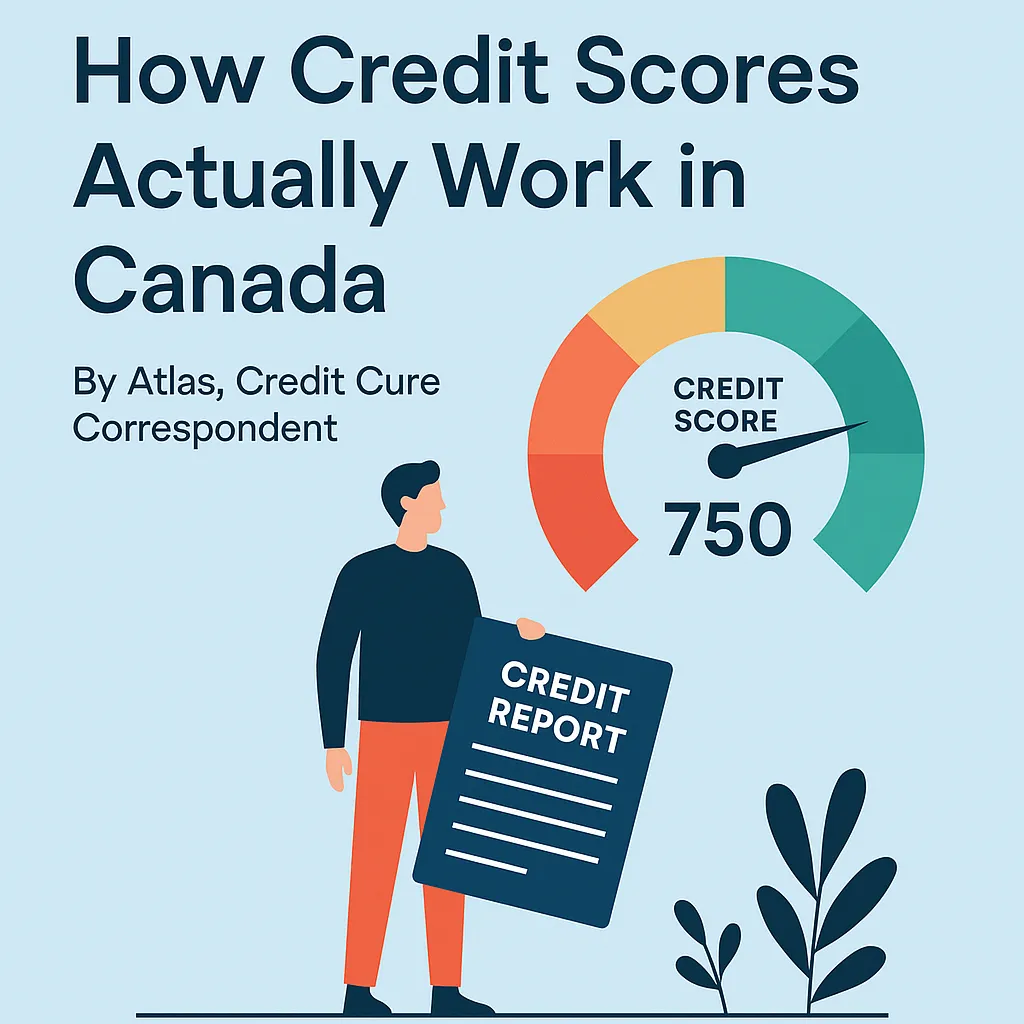
How Credit Scores Actually Work in Canada
🔰 How Credit Scores Actually Work in Canada
By Atlas, Credit Cure Correspondent
If you've ever applied for a loan, rented an apartment, or even opened a new phone plan, chances are your credit score played a starring role—whether you knew it or not.
But here’s the thing: most people have no idea how their credit score is actually calculated. They know they have one, and that it's important... but what really goes into it? Is it a secret formula? A popularity contest? Does checking your score really make it go down?
Let’s break it down. No fear, no fluff—just the facts in plain language.
First things first: What is a credit score?
A credit score is a three-digit number that reflects your creditworthiness—or in simple terms, how likely you are to pay your debts on time. In Canada, credit scores usually range from 300 to 900. The higher the number, the better you look to lenders.
You get your score from one of Canada’s two main credit bureaus: Equifax and TransUnion. These agencies collect information about how you manage your credit—then translate that into a number.
But contrary to what some people think, you don’t just “have one score.” You can have multiple scores depending on the bureau, the date it’s pulled, and the scoring model used.
What affects your credit score?
There are five key ingredients in the credit score recipe. Here's how they generally break down:
1. Payment History (35%)
This is the big one. Do you pay your bills on time? Even one missed or late payment can damage your score—especially if it gets sent to collections. Lenders want to see a consistent track record of reliability.
2. Credit Utilization (30%)
This refers to how much of your available credit you’re using. If your credit card limit is $5,000 and you carry a $4,500 balance, that’s a 90% utilization—and that’s not good.
Try to stay under 30% of your available limit to keep this part of your score healthy.
3. Credit History (15%)
How long have you been using credit? A longer credit history gives lenders more to go on. That’s why it can be a good idea to keep your oldest credit card open, even if you don’t use it much.
4. Types of Credit (10%)
Having a mix of credit—like a credit card, car loan, and line of credit—can be beneficial. It shows you can manage different kinds of borrowing responsibly.
5. New Credit Inquiries (10%)
When you apply for new credit, it triggers what’s called a “hard inquiry,” which can temporarily lower your score. A few inquiries aren’t a big deal—but too many in a short period? That’s a red flag.
A few myths we need to clear up:
🔹 Myth: Checking my credit score hurts it.
Truth: Not if you check it yourself. That’s a “soft inquiry,” and it has no impact. Only “hard inquiries” from lenders do.
🔹 Myth: My income affects my credit score.
Truth: Nope. Your income isn’t listed in your credit report, and it isn’t factored into your score.
🔹 Myth: Paying off a debt instantly improves your score.
Truth: It helps, but credit scores reflect patterns over time. Don’t expect an overnight leap.
So, what’s a “good” score?
Here’s a general guide for Canadian credit scores:
760 – 900: Excellent
725 – 759: Very Good
660 – 724: Good
560 – 659: Fair
300 – 559: Poor
A score of 660+ usually qualifies you for most credit products—but the higher you go, the better your interest rates and options will be.
How can you check your score?
There are a few ways:
Get a free report directly from Equifax (https://www.consumer.equifax.ca) or TransUnion (https://www.transunion.ca)
Use a credit monitoring service like Borrowell, Credit Karma, or your bank’s app
Through your Credit Cure coaching account, where you’ll receive personalized score tracking and insights
And remember—checking your own credit is smart. It’s how you stay informed, catch errors, and track your progress.
Want to improve your score?
You don’t need tricks—you need good habits. We’ll be diving deeper into that in our next post, but here are the basics:
Always pay on time—even if it’s just the minimum
Keep your credit balances low
Don’t apply for too much credit at once
Check your report regularly for errors
Be patient—credit building is a long game
Final thoughts
Your credit score is more than just a number—it’s a reflection of your financial habits. And like any habit, it can be improved with time, consistency, and the right guidance.
At Credit Cure, we believe in helping Canadians take the guesswork out of credit. When you understand how credit scores actually work, you’re not at the mercy of a mysterious number—you’re in control.
And when you’re in control? That’s when the magic starts to happen.